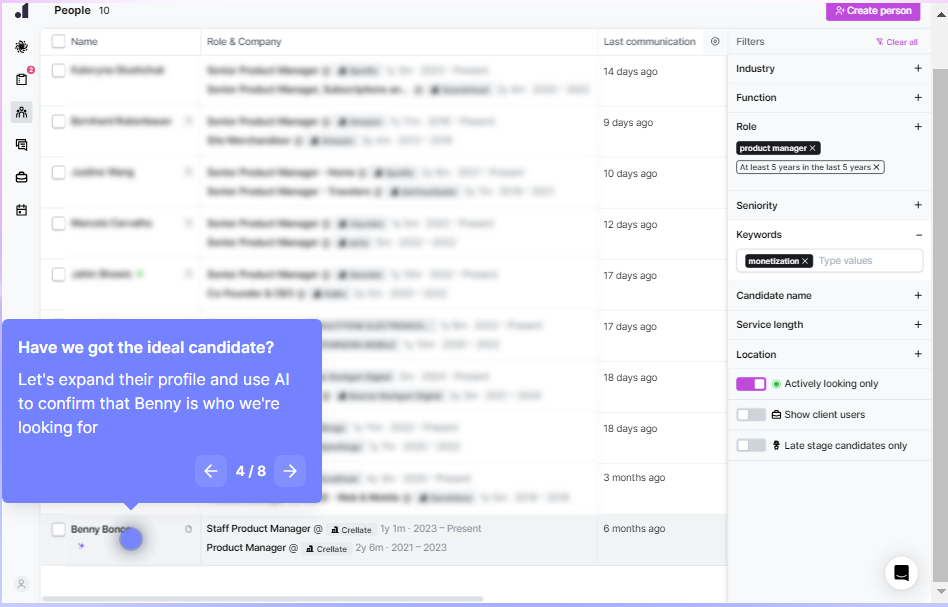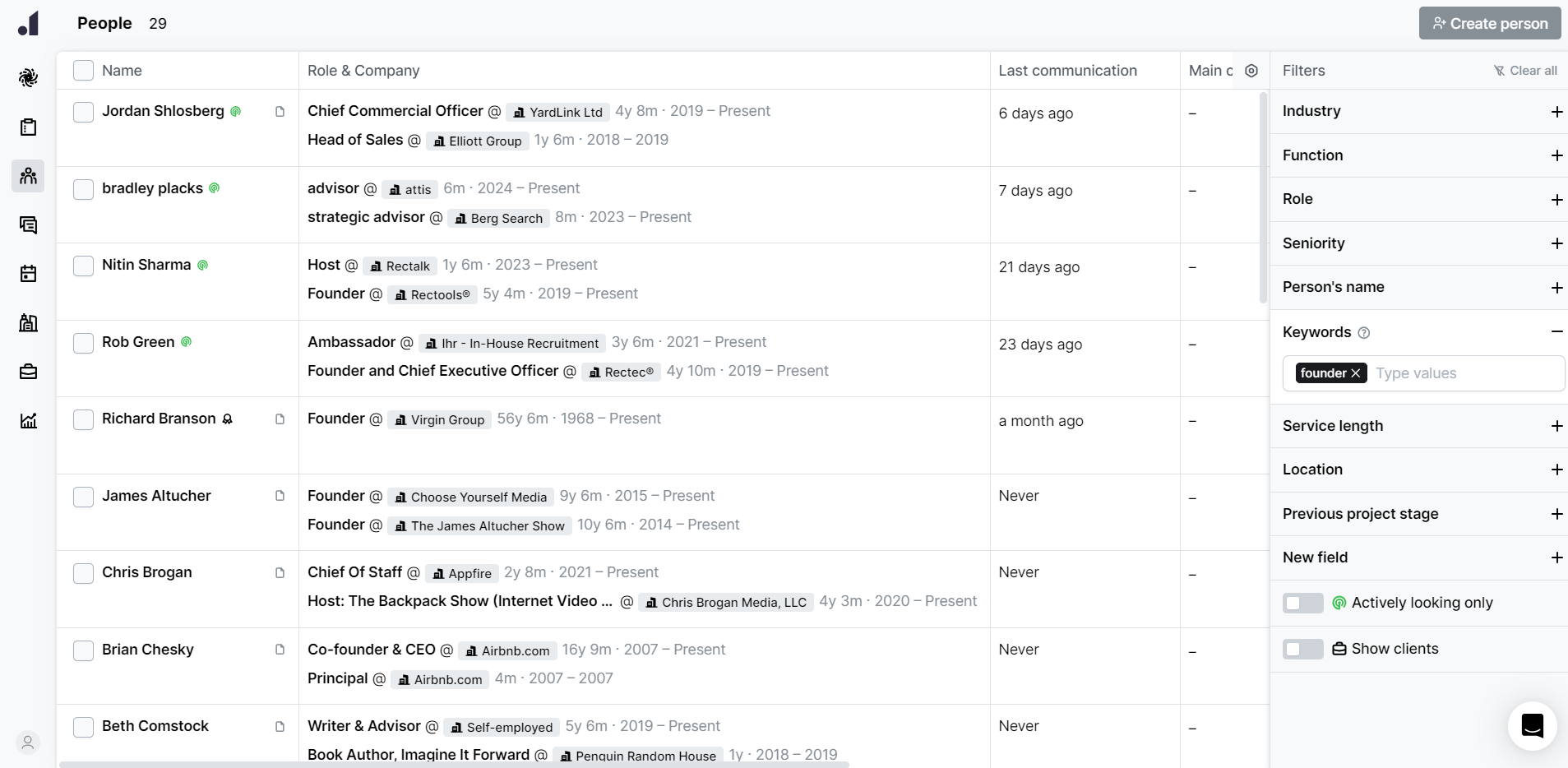
// Executive Search Best Practices, Recruitment Strategies, Recruitment Technology
Struggling with Duplicate Records? 10 Tips for Effective Candidate Database Management
10/07/2024
9 MIN
In executive search, every lead and every interaction counts, managing a candidate database efficiently can make all the difference between closing deals swiftly or losing valuable opportunities.
A well-organized candidate database not only enhances search effectiveness but also improves the overall candidate experience and streamlines the recruitment process.
Why an efficient candidate database is important?
Imagine a scenario where a seasoned executive recruiter receives a referral for a top-tier CEO position at a leading tech firm. With a few keystrokes, they access a meticulously curated database with profiles of highly qualified candidates, complete with detailed notes on their career aspirations, skills, and preferences.
This instant access not only saves time but also ensures that the recruiter can quickly identify and engage with the perfect fit for the role.
An efficient candidate database is not just a repository of resumes – it’s a strategic tool that empowers recruiters to make informed decisions and deliver exceptional results. Here’re are ten tips to manage your candidate database effectively:
10 Tips to manage your candidate database effectively
▶️ Tip 1 – Invest in a modern AI-powered CRM system
When every hire can shape the future of a company, the importance of a modern CRM system cannot be overstated. It’s not just about managing data – it’s about finding a tool that can streamline your entire recruitment process, from sourcing, and candidate searches, to onboarding, while providing a personalized experience for every candidate.
Imagine having the ability to sift through thousands of candidate profiles effortlessly, narrowing down your search based on specific criteria like industry experience or location.
A CRM with advanced search filters empowers you to pinpoint the perfect fit for crucial roles, whether it’s a senior executive or a specialized technical position.
Picture a dashboard tailored to your unique preferences, offering a comprehensive view of candidate pipelines and essential metrics. Whether you’re tracking application statuses or analyzing recruitment KPIs, customizable dashboards ensure you have the insights needed to make swift, informed decisions.
In today’s interconnected world, seamless integration with platforms like LinkedIn is essential. A CRM that syncs effortlessly with external sources not only enhances sourcing efficiency but also enriches candidate profiles with up-to-date information, giving you a competitive edge in the talent market.
A robust CRM acts as the backbone of your candidate management strategy, centralizing data, automating tasks, and providing real-time insights that drive your recruitment efforts forward. It’s about more than just efficiency; it’s about creating a seamless experience for candidates and recruiters alike.
💡 Our AI powered CRM transforms data management into an easy, automated experience. With Atlas, data accuracy is assured from the get-go. No more endless tagging or manual data entry – Atlas handles it all, making your candidate database not just useful but exponentially more efficient.
Imagine every email and resume integrated into Atlas, giving you a comprehensive view of candidate interactions and profiles. It captures and extracts data from resumes automatically, ensuring GDPR compliance while saving you valuable time.
Atlas goes beyond resumes – it enriches candidate profiles with insights gleaned from emails, calls, and interviews, making every piece of information searchable within the CRM. From salary expectations to availability, you have everything at your fingertips to make informed decisions swiftly.
With AI features, Atlas transforms how you search for candidates by tagging and enhancing profiles in your database. This means less time spent searching and more time engaging with top talent, ultimately driving recruitment success.
Choosing the right CRM system like Atlas isn’t just about managing data, it’s about transforming your recruitment strategy. With advanced features, seamless integrations, and AI-driven enhancements, you can turn your candidate database into a strategic asset that propels your recruitment efforts to new heights.
Experience the future of candidate database management with Atlas – where efficiency meets innovation. Discover a new standard in executive search.
Get early access
▶️ Tip 2 – Regularly update candidate information
Keeping candidate data current is crucial for staying ahead. Implement a structured approach to ensure your database remains accurate and relevant:
- Set up a schedule for updates – Establish a regular schedule, such as weekly or monthly reviews, to verify contact details, job changes, and qualifications. Dedicated time for updates ensures your database reflects each candidate’s current professional status.
- Collect updated information – Proactively gather updated data through automated email campaigns, LinkedIn alerts, and regular candidate check-ins. Incorporating feedback from interactions enriches profiles with qualitative insights.
- Keep data current – Maintaining accurate information minimizes outreach errors, enhances engagement rates, and strengthens recruiter credibility. Updated data allows prompt response to client needs with the most suitable candidates, ensuring efficient placements and client satisfaction.
▶️ Tip 3 – Categorize candidates effectively
Segment candidates based on industry, job function, seniority level, or specific skill sets using customizable tags and categories. This categorization facilitates targeted searches and ensures candidates are accurately matched to fill job openings.
Use advanced filtering options within your CRM to quickly identify candidates who meet specific client criteria. Segmentation allows recruiters to tailor their communication and outreach strategies for maximum impact.
By organizing candidates into meaningful categories, recruiters can expedite the candidate sourcing and recruitment process, reduce search time, and improve the accuracy of candidate matches. This structured approach also supports personalized candidate engagement strategies.
▶️ Tip 4 – Maintain data quality
Data cleanliness is crucial for reliable decision-making and effective candidate management. Inaccurate or outdated information can lead to missed opportunities and hinder recruitment outcomes.
Implement validation protocols during data entry, conduct regular audits to identify and correct errors, and train team members on data hygiene best practices. Utilize data cleaning tools and techniques to scrub the database of duplicate or irrelevant entries.
Use automated data validation tools, data enrichment services, and manual review processes to maintain data integrity. Regularly update data quality standards and protocols to adapt to evolving recruitment needs.
Don’t waste time on a recruitment platform you don’t like!
Eliminate duplicate companies in your database, extract every company from resumes, and categorize them under unique parent companies for better industry insight.
Simplify your process and start filling job openings efficiently today!
See how our AI powered CRM works.
▶️ Tip 5 – Leverage technology for data entry and management
Deploy AI-driven tools for parsing resumes, extracting relevant data fields, and populating CRM entries automatically. This saves time typing in data manually and makes it more accurate.
Use AI algorithms to suggest candidate matches based on historical data and predictive analytics. Machine learning models can analyze candidate behavior patterns to optimize recruitment strategies.
Automate routine tasks such as email follow-ups, appointment scheduling, and candidate status updates to streamline workflows and free up time for strategic activities.
Learn about the benefits of AI-driven auto-tagging in your recruitment platform to streamline your hiring process. See how it automatically tags candidates who express interest in job opportunities.

▶️ Tip 6 – Ensure compliance with data privacy regulations
Familiarize yourself with data protection laws such as GDPR (General Data Protection Regulation) to ensure ethical and legal handling of candidate data. Use strong security measures to protect sensitive information.
Adopt secure data storage solutions, obtain candidate consent for data processing, and establish protocols for data access and sharing within your organization. Conduct regular compliance audits to maintain adherence to regulations.
Conduct periodic reviews of data privacy policies and practices to align with regulatory changes and industry standards. Educate your team on data protection principles and empower them to uphold compliance in daily operations.
▶️ Tip 7 – Engage with passive candidates
Keep passive candidates warm. Develop personalized communication strategies to nurture candidate relationships with passive candidates over time. Share industry insights, invite them to networking events, or offer career development resources.
Maintain ongoing dialogue with passive candidates to keep your organization top of mind when they are ready to explore new opportunities. Reaching out personally shows you care about their professional development.
Use CRM features for automated email campaigns, personalized newsletters, and targeted social media outreach. Leverage analytics to track engagement metrics and adjust your communication strategy accordingly.
▶️ Tip 8 – Utilise analytics and reporting
Monitor metrics such as candidate sourcing channels, conversion rates, time-to-hire, and candidate satisfaction scores. Study data trends to find opportunities and improve how you find new candidates.
Use predictive analytics to forecast hiring needs, allocate resources effectively, and anticipate candidate preferences. Reporting dashboards provide actionable insights for improving recruitment outcomes.
Establish a cadence for reporting on recruitment KPIs and performance metrics to stakeholders. Present data-driven insights and recommendations for continuous improvement in candidate sourcing and engagement.
▶️ Tip 9 – Train your team
Encourage ongoing professional development for recruiters to stay abreast of industry trends, CRM updates, and best practices in candidate management.
Offer specialized training sessions on CRM utilization, data privacy compliance, and effective candidate engagement strategies. Provide resources such as webinars, workshops, and certification programs.
Promote collaboration and knowledge exchange among team members to leverage collective expertise in candidate database management. Recognize and reward achievements in data-driven recruitment outcomes.
▶️ Tip 10 – Backup your data regularly
Implement robust data backup protocols to protect against data loss due to system failures, cyber threats, or human error. Make sure you have backup plans in place to easily recover data if something goes wrong.
Evaluate cloud-based backup services or on-premises solutions based on your organization’s security requirements and scalability needs. Establish automated backup schedules to minimize disruption to recruitment operations.
Schedule regular backups of candidate data to ensure data continuity and integrity. Test data restoration procedures periodically to verify backup efficacy and readiness.
FAQs about candidate database management
1. How often should your candidate database be updated?
Candidate information should be updated regularly to ensure accuracy and relevance. Typically, recruiters should schedule updates weekly or monthly to verify contact details, employment status, skills, and qualifications.
Proactively collecting updated information through automated campaigns, LinkedIn alerts, and candidate interactions helps maintain a current database.
2. How can you effectively categorize candidates?
Effective categorization of candidates involves creating relevant tags, using filters, and segmentation based on criteria such as industry, job function, location, and skills.
This helps recruiters quickly identify and retrieve candidate profiles that match specific client requirements or job roles, enhancing search efficiency and candidate matching.
3. How can technology help in managing your candidate database?
Technology plays a pivotal role in managing your candidate database by automating data entry, enriching candidate profiles with AI-driven insights, and ensuring compliance with data privacy regulations like GDPR.
An advanced customer relationship management (CRM) or applicant tracking system (ATS) integrates with external platforms, such as LinkedIn, and uses AI to streamline processes, reduce manual errors, and enhance overall database usability and effectiveness.
4. What steps can recruiters take to ensure data quality in their candidate databases?
To keep data accurate, recruiters should check their databases often. You need to clean up data, remove duplicates, update old information, and make sure they follow GDPR rules.
Using data cleaning tools and implementing strict data entry protocols contribute to maintaining high-quality candidate databases.
5. How can recruiters engage with passive candidates effectively?
Engaging with passive candidates involves nurturing relationships through personalized communication, showcasing company culture and career opportunities, and maintaining regular contact.
Automated engagement tools, such as email campaigns and social media outreach, can help recruiters stay connected with passive candidates and build a talent pipeline for future needs.
6. What role do analytics and reporting play in managing candidate databases?
Analytics and reporting provide valuable insights into candidate sourcing, engagement, and recruitment performance.
Key metrics, such as candidate conversion rates, time-to-fill, and source effectiveness, help recruiters optimize their strategies, make data-driven decisions, and demonstrate ROI to clients. Regular reporting ensures transparency and accountability in candidate management practices.
7. How important is compliance with data privacy regulations in candidate database management?
Compliance with data privacy regulations, such as GDPR (General Data Protection Regulation), is crucial in candidate database management to protect candidate information and uphold ethical standards.
Recruiters must implement secure data handling practices, obtain candidate consent for data processing, and conduct regular audits to ensure compliance and mitigate risks.
8. What are the best practices for training recruitment teams in candidate database management?
Training recruitment teams in candidate database management involves educating them on CRM system functionalities, data management protocols, and compliance requirements.
Continuous learning programs, workshops, and access to CRM training modules help recruiters adopt best practices, improve database utilization skills, and enhance overall recruitment efficiency.







